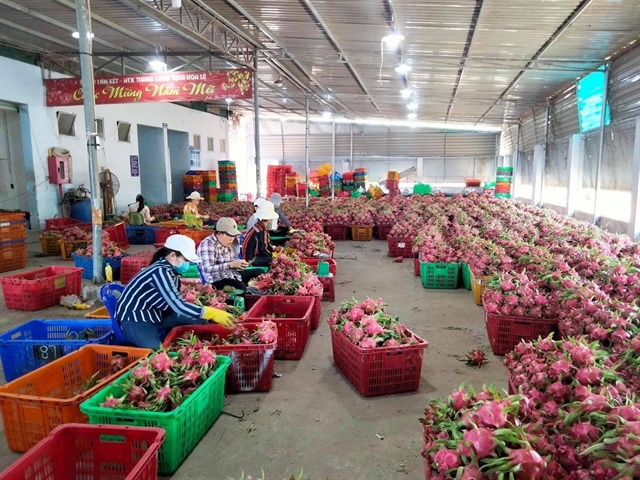
BÌNH THUẬN – To sustainably develop dragon fruit farming, localities should reorganise production from the commune level upwards based on understanding production status and market demand, Minister of Agriculture and Rural Development Lê Minh Hoan has said.
Speaking at a seminar on dragon fruit production and consumption held in Bình Thuận Province on February 21, he said localities should bring together farmers and companies, which would help switch from unofficial to official exports.
The country had 64,000ha under the fruit and an output of 1.4 million tonnes last year, double the 2015 production, according to the Ministry of Agriculture and Rural Development’s (MARD) Plant Cultivation Department.
The fruit is grown in nearly all the country’s 63 cities and provinces but the south – central province of Bình Thuận, and the Cửu Long (Mekong) Delta provinces of Long An and Tiền Giang are the biggest producers.
Bình Thuận tops with 33,500ha and an annual output of 700,000 tonnes.
Some 15 per cent of its output is consumed domestically and the rest is exported, mostly to China.
Lê Thanh Tùng, head of the Plant Cultivation Department, said the highest exports of the fruit, worth nearly US$1.2 billion, were in 2019.
Some 90 per cent of exports were to China and through unofficial channels.
But there had been difficulties since last year because of the COVID – 19 pandemic, which had affected exports to China, resulting in a deep price decline and losses to farmers, especially when they grew it during the off-season.
The country was expected to produce 247,000 tonnes in the first quarter of this year, and exports were still affected by the pandemic.
Many farmers had therefore stopped growing in the off-season.
Mai Kiều, director of the Bình Thuận Department of Agriculture and Rural Development, said, “The province has identified dragon fruit as a key fruit.”
It fetches VNĐ350 – 400 million ($15,300 – 17,500) per hectare annually, including profits of VNĐ150 – 170 million ($6,600 – 7,400), according to Kiều.
But cultivation is scattered and mostly on a small scale, resulting in a lack of large quantities with even quality for exports.
The yield, quality and competitiveness are still low.
Lê Tuấn Phong, chairman of the province People’s Committee, said MARD should add dragon fruit to the country’s list of key national crops and have strategies and policies based on it to sustainably produce the fruit and to carry out trade promotions at home and abroad.
MARD should have policies to make more products from the fruit and resolve problems related to selling it faced by farmers, he said.
Phạm Văn Trọng, deputy chairman of the Tiền Giang Province People’s Committee, said to help farmers sell dragon fruit, localities needed relevant agencies to provide market information and have policies and mechanisms that meet requirements.
Delegates at the seminar said it was difficult to link up dragon fruit co-operatives and companies to ensure consumption.
MARD should expand export markets to avoid dependence on one market, they said.
Because of the export decline since last year, the prices of the fruit have fallen dramatically to VNĐ2,000 – 3,000 a kilogramme at farms now. – VnExpress News
- Reduce Hair Loss with PURA D’OR Gold Label Shampoo
- Castor Oil Has Made a “Huge” Difference With Hair and Brow Growth
- Excessive hair loss in men: Signs of illness that cannot be subjective
- Dịch Vụ SEO Website ở Los Angeles, CA: đưa trang web doanh nghiệp bạn lên top Google
- Nails Salon Sierra Madre
 VnExpress News The News Gateway of Vietnam
VnExpress News The News Gateway of Vietnam




